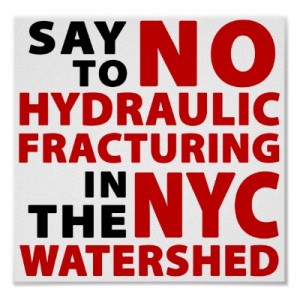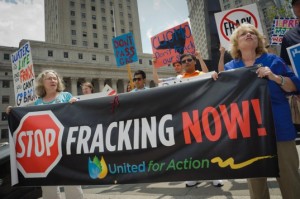You’ve probably heard a lot about the controversial practice of natural gas drilling, or fracking as it’s more commonly called. It seems like every few weeks or months there’s some new story about the benefits or harm of fracking. No matter the story, it seems like it’s always followed by protest or disagreement over the latest issue. New York has become the latest site of controversy over this means of extracting alternative energy with Governor Andrew Cuomo considering allowing some communities in Southern New York the power to decide whether or not fracking will happen in their towns. For this reason, Gov. Cuomo and the Department of Environmental Conservation (DEC) have come under fire.
 Why is fracking so controversial? The process of fracking injects chemically treated water at very high pressures deep underground to release natural gases for use as energy. The main problem with this practice is that the evidence is still out on the harm, or potential harm, that can result for the environment and health of those nearby. There is research both for and against the practice. It is this research that really creates the controversy in New York. Gov. Cuomo vowed, when he took up the issue of possibly lifting the moratorium on fracking, to base his decision off science and facts. However, scientists, physicians, economists and many other are crying foul that the review on fracking pros and cons compiled by the DEC for Gov. Cuomo’s use in making a decision is blatantly pro-fracking and ignores other scientific evidence. Many suspect the director behind the review has ties to the gas industry and that the outcome will be a biased and unfair decision, which would be a real violation of ethics.
Why is fracking so controversial? The process of fracking injects chemically treated water at very high pressures deep underground to release natural gases for use as energy. The main problem with this practice is that the evidence is still out on the harm, or potential harm, that can result for the environment and health of those nearby. There is research both for and against the practice. It is this research that really creates the controversy in New York. Gov. Cuomo vowed, when he took up the issue of possibly lifting the moratorium on fracking, to base his decision off science and facts. However, scientists, physicians, economists and many other are crying foul that the review on fracking pros and cons compiled by the DEC for Gov. Cuomo’s use in making a decision is blatantly pro-fracking and ignores other scientific evidence. Many suspect the director behind the review has ties to the gas industry and that the outcome will be a biased and unfair decision, which would be a real violation of ethics.
Although I lean towards the side that says fracking is bad, I honestly don’t know because I think there needs to be more reliable, unbiased research done. But, what I do think is that this fracking issue in New York points to a larger issue with natural energy that needs to be addressed. We have to remember that not all alternative or natural fuels are necessarily without fault. Take the example of using corn as fuel. This seemed like a great idea at first with the overabundance of corn in America. But as we’re seeing now with the major drought in the Midwest, prices on corn could skyrocket, making this no longer a reliable or viable source of energy. But, we must also keep in mind that the reality is that there is no magic bullet when it comes to energy sources. We must be careful and know all the effects of each type of alternative energy before their use becomes widespread.
What is needed is what the scientists, etc. are calling for: more research and studies on the environmental, economical, and health effects of  fracking. Unfortunately, this kind of research is inexcusably seriously underfunded; meaning that we will likely not know the true effects of fracking for a long time, perhaps after irreversible damage has already been done. For the research that has been conducted, and will be conducted in the future, those conducting studies must be held accountable to disclose their ties with the natural gas industry. Additionally, politicians and figures in environmental decision-making positions, must disclose any personal or professional relationships with the gas industry and watchdog groups, like SourceWatch, should continue to check for this. Transparency is crucial in sorting through real science on the effects of fracking versus that which may have an alternative agenda other than provide scientific fact.
fracking. Unfortunately, this kind of research is inexcusably seriously underfunded; meaning that we will likely not know the true effects of fracking for a long time, perhaps after irreversible damage has already been done. For the research that has been conducted, and will be conducted in the future, those conducting studies must be held accountable to disclose their ties with the natural gas industry. Additionally, politicians and figures in environmental decision-making positions, must disclose any personal or professional relationships with the gas industry and watchdog groups, like SourceWatch, should continue to check for this. Transparency is crucial in sorting through real science on the effects of fracking versus that which may have an alternative agenda other than provide scientific fact.
What you can do is learn about what your local and state governments’ policies and plans on natural gas drilling are. If you agree or don’t agree, let you representatives know. Research what scientific research they base their decisions off of and try to learn whether or not they are biased or have some sort of conflict of interest that could affect the results. Also, there are tons of pro, con and awareness-raising fracking groups throughout the US and the world. A quick Google search will tell you what is in your area. Good, bad or somewhere in between, what we need in this country is more research and more transparency when it comes to our energy choices.


